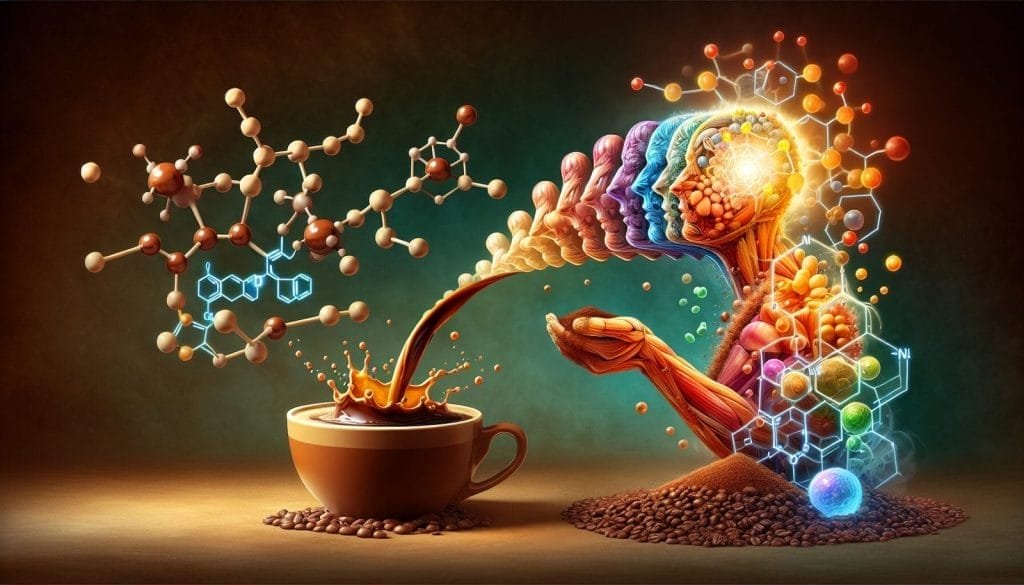Imagine a world where your morning jolt of java came in the form of a delectable snack. In this article, we embark on a whimsical exploration of the effects that eating coffee can have on your body. We’ll unravel the secrets of this unconventional culinary experience, from the delightful bursts of energy to the potential health benefits. So sit back, grab a cup of your favorite brew, and prepare to savor a whole new way of experiencing the beloved elixir.

Understanding the Consumption of Coffee
Definition of coffee
Coffee, derived from the seeds of the Coffea plant, is a popular and widely consumed beverage around the world. It is prepared by grinding and brewing these seeds, resulting in a stimulating and aromatic drink. Coffee can be enjoyed in various forms, such as black coffee, espresso, cappuccino, and many others, with each method offering a unique taste and experience.
Process of coffee consumption
The process of coffee consumption involves the intake of brewed coffee through drinking. It can be enjoyed hot or cold, depending on personal preference. Many individuals start their day with a cup of coffee, finding comfort and energy in its rich flavor and awakening effect. Coffee shops and cafes have also become social gathering places, offering a sense of community and relaxation for coffee enthusiasts.
Popularity and common methods of coffee intake
Coffee’s popularity spans across cultures and continents. It is consumed in various ways globally, reflecting cultural traditions and preferences. In some regions, people enjoy it in its purest form, as black coffee, whereas others prefer milky and frothy beverages like lattes and macchiatos. Additionally, coffee can be brewed using different methods such as drip brewing, French press, and espresso machines, each method offering a distinct taste and intensity.
Nutritional Profile of Coffee
Basic nutritional elements
Coffee, in its pure form, is a low-calorie beverage, providing nearly zero fats, proteins, and carbohydrates. However, it does contain essential vitamins and minerals like potassium, magnesium, and niacin. These nutrients, although present in small amounts, contribute to overall health and well-being.
Key antioxidants present
The consumption of coffee introduces a significant amount of antioxidants into the body. Coffee is rich in compounds like polyphenols, which act as powerful antioxidants. These antioxidants help neutralize harmful free radicals in the body, reducing oxidative stress and promoting cellular health.
Caloric contents and caffeine levels
A typical cup of black coffee contains approximately 2 calories and is virtually free of fats and sugars. However, the caloric content may vary depending on the additions, such as milk, sugar, or syrups. Caffeine, a natural stimulant found in coffee, varies depending on the brew, with an average cup containing around 95 milligrams. The caffeine content can affect individuals differently, influencing their energy levels and overall experience.
Impact of Coffee on Physical Health
Effect on cardiovascular system
Studies have shown that moderate coffee consumption may have positive effects on cardiovascular health. The antioxidants present in coffee may help reduce the risk of heart disease and stroke by improving blood flow, reducing inflammation, and supporting overall heart health.
Impact on digestion and metabolism
Coffee consumption can stimulate the digestive system, aiding in bowel movements and preventing constipation. Additionally, caffeine in coffee has been found to increase metabolic rate, potentially leading to a temporary boost in calorie burning.
Influence on sleep cycle and energy levels
Coffee’s stimulating effects on the central nervous system can impact sleep patterns and energy levels. Consuming caffeinated coffee close to bedtime may interfere with falling asleep or disrupt the quality of sleep. However, when consumed in moderation and at appropriate times, coffee can enhance alertness and improve energy levels throughout the day.
Impact of Coffee on Mental Health
Effect on cognitive performance
Coffee has long been associated with enhanced cognitive performance, including improved focus, attention, and reaction time. The caffeine in coffee acts as a mild stimulant, increasing the release of neurotransmitters like dopamine and norepinephrine, which play a role in cognitive function.
Impact on mood and mental alertness
Regular coffee consumption has been linked to a reduction in the risk of depression and improved overall mood. The caffeine present in coffee can increase feelings of alertness, boost mood, and even potentially lower the risk of suicide in certain individuals.
Potential for dependency and withdrawal symptoms
While coffee can provide temporary mental and physical benefits, excessive and prolonged consumption can lead to dependency. Some individuals may experience withdrawal symptoms such as headaches, fatigue, and irritability when abruptly stopping or reducing their coffee intake. Monitoring and controlling coffee consumption is crucial to preventing dependency.

Long-term Effects of Coffee Consumption
Risk of chronic diseases
There is ongoing debate regarding the long-term effects of coffee consumption on the risk of chronic diseases. Some studies suggest that moderate coffee intake may help reduce the risk of certain conditions, including type 2 diabetes, Parkinson’s disease, and certain types of cancer. However, more research is needed to fully understand these associations.
Impact on bone health
Excessive coffee consumption, especially when combined with inadequate calcium intake, may have detrimental effects on bone health. Coffee contains compounds that can interfere with calcium absorption, potentially leading to weaker bones and an increased risk of osteoporosis.
Potential impact on lifespan
Research examining the link between coffee consumption and lifespan has yielded mixed results. Some studies suggest that moderate coffee intake may be associated with a slight increase in lifespan, while others have found no significant effect. Factors such as overall health, lifestyle, and the presence of other risk factors play a substantial role in determining individual outcomes.
Benefits of Coffee Consumption
Antioxidant properties and disease prevention
Coffee’s high antioxidant content contributes to its potential role in preventing certain diseases. Antioxidants can help protect against cellular damage and reduce the risk of conditions such as heart disease, certain cancers, and neurodegenerative disorders.
Potential weight loss aid
Coffee has been studied for its potential to aid in weight loss. Caffeine present in coffee can increase metabolism and promote fat oxidation. Furthermore, coffee may act as an appetite suppressant, temporarily reducing feelings of hunger and aiding in calorie control.
Possible protective effect on neurological health
Regular coffee consumption has been associated with a reduced risk of neurodegenerative diseases such as Alzheimer’s and Parkinson’s. The exact mechanisms behind this association are still being investigated, but it is believed that the antioxidants and caffeine present in coffee may offer protective effects on the brain.
Potential Risks and Side Effects of Coffee
Possible effects on anxiety and heart conditions
Individuals with anxiety disorders or certain heart conditions may be more sensitive to the effects of caffeine. High levels of caffeine can induce increased heart rate, palpitations, and feelings of restlessness or anxiety in susceptible individuals. It is advisable for such individuals to limit their caffeine intake or opt for decaffeinated coffee.
Impact on sleep quality
Consuming coffee too close to bedtime can disrupt sleep patterns and contribute to insomnia. The stimulating effects of caffeine can interfere with falling asleep or maintaining restful sleep. It is recommended to avoid coffee consumption within a few hours of bedtime to promote quality sleep.
Risk of overconsumption and toxicity
Excessive coffee consumption can lead to caffeine toxicity, commonly known as caffeine overdose. Symptoms of caffeine toxicity include rapid heartbeat, tremors, anxiety, and gastrointestinal disturbances. It is essential to consume coffee in moderation and be mindful of personal caffeine tolerance.
Differences between Consuming Coffee Beans and Drinking Coffee
Taste and texture differences
consuming coffee beans directly offers a completely different experience compared to drinking coffee. Coffee beans have an intense and bitter taste, with a crunchy texture. On the other hand, drinking coffee provides a more balanced and nuanced flavor profile, as the brewing process extracts the coffee’s soluble compounds.
Variation in caffeine levels
Eating coffee beans will result in a higher caffeine intake compared to consuming brewed coffee. The brewing process typically extracts a significant portion of caffeine, resulting in lower levels in the final drink. For those seeking a higher caffeine content, eating coffee beans or opting for concentrated forms like Espresso shots may be a preferred choice.
Impact on digestion process
Whole coffee beans are harder to digest, potentially causing discomfort and digestive issues. The brewing process breaks down the compounds in coffee, making it easier for the body to process and absorb. Drinking coffee is more gentle on the digestive system and allows for the gradual release of caffeine, contributing to a smoother experience.
Methods to Healthily Consume Coffee
Ideal quantities to consume
The ideal quantity of coffee consumption varies from person to person. Moderate coffee intake, defined as 3-4 cups per day, is generally considered safe and associated with potential health benefits. However, it is important to consider individual sensitivity to caffeine and health conditions when determining personal limits.
Importance of hydration
Coffee, while providing liquid intake, can have a diuretic effect due to caffeine content. To maintain hydration, it is crucial to balance coffee consumption with adequate water intake throughout the day. Staying hydrated helps optimize bodily functions and supports overall health.
Balancing consumption with healthy diet and lifestyle
Coffee should be viewed as part of a balanced and healthy lifestyle. While it can offer certain benefits, it is important not to rely solely on coffee for overall well-being. A nutritious diet, regular exercise, sufficient sleep, and stress management are equally important components of a healthy lifestyle.
Current Research and Debates on Coffee Consumption
Controversies on health impacts
The impact of coffee on health remains a topic of debate within the scientific community. While coffee consumption has been associated with numerous potential benefits, conflicting studies highlight the need for further investigation and caution.
Scientific research supporting coffee consumption
Several studies have shed light on the beneficial aspects of coffee consumption. These studies have focused on the potential protective effects against certain diseases, improved cognitive function, and increased lifespan. However, it is important to note that more research is needed to establish conclusive evidence.
Ongoing research and areas for future studies
Research on coffee consumption continues to evolve, with ongoing studies exploring various aspects. Scientists are investigating the relationship between coffee and mental health, examining the impact of different coffee compounds, and delving into the potential long-term effects on specific populations. Future research may provide more comprehensive insights into the effects of coffee consumption on the human body.
In conclusion, coffee consumption has become an integral part of our daily routines, offering enjoyment, energy, and potential health benefits. Understanding the nutritional profile, health impacts, and proper consumption methods allows individuals to make informed choices regarding coffee intake. While coffee can be a delightful and beneficial addition to one’s lifestyle, it is important to maintain moderation and balance it with a healthy diet and overall wellness practices.




